

Individualist anarchism. Overview[edit] Individualist anarchism of different kinds have a few things in common.

These are: 1. Anarchism and Friedrich Nietzsche. Overview[edit] Friedrich Nietzsche During the last decade of the 19th century, Nietzsche was frequently associated with anarchist movements, in spite of the fact that in his writings he seems to hold a negative view of anarchists.[1] This may be the result of a popular association during this period between his ideas and those of Max Stirner.[3] [4]
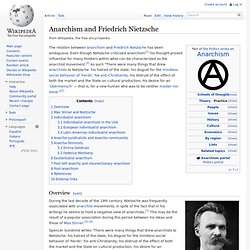
Voltairine de Cleyre. Life[edit] Born in the small town of Leslie, Michigan,[1] she later moved with her family to St.
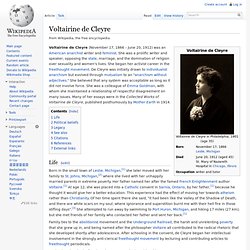
Johns, Michigan,[2] where she lived with her unhappily married parents in extreme poverty. Her father named her after the famed French Enlightenment author Voltaire.[1] At age 12, she was placed into a Catholic convent in Sarnia, Ontario, by her father,[1] because he thought it would give her a better education. This experience had the effect of moving her towards atheism rather than Christianity.
Emma Goldman. 19th and 20th-century Lithuania-born anarchist, writer and orator Emma Goldman (June 27 [O.S.
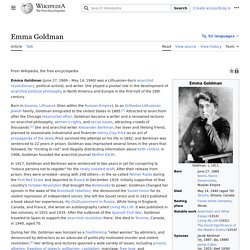
June 15], 1869 – May 14, 1940) was an anarchist political activist and writer. She played a pivotal role in the development of anarchist political philosophy in North America and Europe in the first half of the 20th century. In 1917, Goldman and Berkman were sentenced to two years in jail for conspiring to "induce persons not to register" for the newly instated draft. Anarcha-feminism. A purple and black flag is often used to represent Anarcha-feminism.
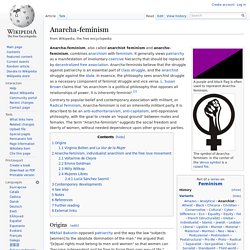
Contrary to popular belief and contemporary association with militant, or Radical Feminism, Anarcha-feminism is not an inherently militant party. It is described to be an anti-authoritarianism, anti-capitalism, anti-oppressive philosophy, with the goal to create an "equal ground" between males and females.
The term "Anarcha-feminism" suggests the social freedom and liberty of women, without needed dependence upon other groups or parties. Origins[edit] Mikhail Bakunin opposed patriarchy and the way the law "subjects [women] to the absolute domination of the man. " Queer anarchism. Anarcho-queer flag.
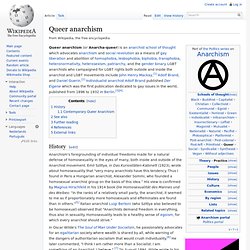
Peggy Kornegger. Peggy Kornegger is an American writer and editor whose work has appeared in a wide variety of feminist, spiritual, and political publications, including Spirit of Change, Bay Windows, Sojourner, Second Wave, Sinister Wisdom, and Plexus.
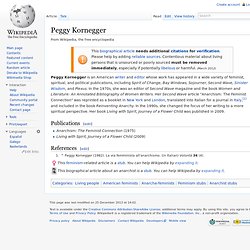
In the 1970s, she was an editor of Second Wave magazine and the book Women and Literature: An Annotated Bibliography of Women Writers. Her Second Wave article "Anarchism: The Feminist Connection" was reprinted as a booklet in New York and London, translated into Italian for a journal in Italy,[1] and included in the book Reinventing Anarchy. In the 1990s, she changed the focus of her writing to a more spiritual perspective.
Her book Living with Spirit, Journey of a Flower Child was published in 2009. Publications[edit] Living with Spirit: Journey of a Flower Child (9781608440580): Peggy Kornegger. L. Susan Brown. L.
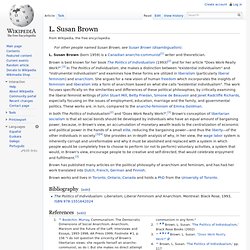
Susan Brown (born 1959) is a Canadian anarcho-communist[1] writer and theoretician. The Politics of Individualism. The Politics of Individualism: Liberalism, Liberal Feminism, and Anarchism is a 1993 political science book by L.
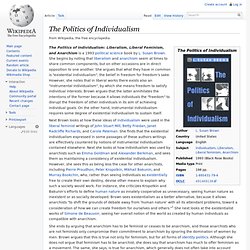
Susan Brown. She begins by noting that liberalism and anarchism seem at times to share common components, but on other occasions are in direct opposition to one another. She argues that what they have in common is "existential individualism", the belief in freedom for freedom's sake. Max Stirner. "Saint Max" redirects here.
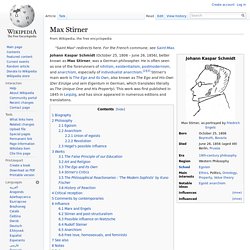
For the French commune, see Saint-Max. The Ego and Its Own. The Ego and Its Own (German: Der Einzige und sein Eigenthum; also translated as Me and My Own) is a philosophical work by German philosopher Max Stirner (1806–1856). This work was first published in 1845, although with a stated publication date of "1844" to confuse the Prussian censors. The Ego and Its Own is a radically individualist critique of modern European civilization and its ideologies, especially Hegelianism and religious thinking. It sets out to promote a unique form of dialectical egoism[disambiguation needed] which is founded on individual autonomy or "Ownness" (Eigenheit). Stirner's book played a role in the decline of left Hegelianism, influenced Karl Marx in his turn towards dialectical materialism and was also an important source for individualist anarchism. Josiah Warren. Josiah Warren (/ˈwɔrən/; 1798 – April 14, 1874) was an individualist anarchist, inventor, musician, and author in the United States.
He is widely regarded as the first American anarchist,[1][2] and the four-page weekly paper he edited during 1833, The Peaceful Revolutionist, was the first anarchist periodical published,[3] an enterprise for which he built his own printing press, cast his own type, and made his own printing plates.[3] Cost the limit of price. In keeping with the tradition of Adam Smith's The Wealth of Nations,[3] the "cost" of labor is considered to be the subjective cost; i.e., the amount of suffering involved in it.[1] Development[edit] The principle was set forth in Warren's Equitable Commerce (among other writings) and has been called a "mainstay of 19th century individualist anarchism.
Stephen Pearl Andrews. Stephen Pearl Andrews Stephen Pearl Andrews (March 22, 1812 – May 21, 1886) was an American individualist anarchist, linguist, political philosopher, outspoken abolitionist, and author of several books on the labor movement and Individualist anarchism. Early life and work[edit] William Batchelder Greene. William B. Greene William Batchelder Greene (April 4, 1819 – May 30, 1878) was a 19th-century individualist anarchist, Unitarian minister, soldier and promotor of free banking in the United States. Biography[edit] Greene returned in 1861 to serve in the American Civil War.
Although a Democrat, he was a strong abolitionist, and at the beginning of the Civil War became colonel of the 14th Massachusetts Infantry, afterward the 1st Massachusetts Heavy Artillery. According to James J. Henry David Thoreau. Green anarchism. Green anarchism (or eco-anarchism) is a school of thought within anarchism which puts a particular emphasis on environmental issues. Tolstoyan movement. Vladimir Chertkov with Leo Tolstoy The Tolstoyan movement is a social movement based on the philosophical and religious views of Russian novelist Leo Tolstoy (1828–1910). Tolstoy's views were formed by rigorous study of the ministry of Jesus, particularly the Sermon on the Mount.
Élisée Reclus. Élisée Reclus (French: [ʁəkly]; 15 March 1830 – 4 July 1905), also known as Jacques Élisée Reclus, was a renowned French geographer, writer and anarchist. He produced his 19-volume masterwork La Nouvelle Géographie universelle, la terre et les hommes ("Universal Geography"), over a period of nearly 20 years (1875–1894). Anarcho-naturism. Anarcho-naturism (also anarchist naturism and naturist anarchism) appeared in the late 19th century as the union of anarchist and naturist philosophies.[1][2][3][4] Mainly it had importance within individualist anarchist circles[5][6][7][8] in Spain,[2][3][9][10] France,[9][11] Portugal.[12] and Cuba.[10][13]
Civil Disobedience (Thoreau) Resistance to Civil Government (Civil Disobedience) is an essay by American transcendentalist Henry David Thoreau that was first published in 1849. In it, Thoreau argues that individuals should not permit governments to overrule or atrophy their consciences, and that they have a duty to avoid allowing such acquiescence to enable the government to make them the agents of injustice. Thoreau was motivated in part by his disgust with slavery and the Mexican–American War.
Title In 1848, Thoreau gave lectures at the Concord Lyceum entitled "The Rights and Duties of the Individual in relation to Government. Walden.